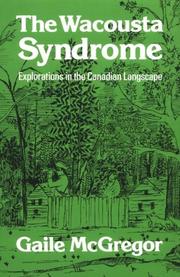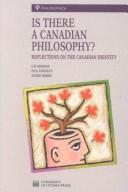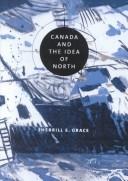| Listing 1 - 10 of 20 | << page >> |
Sort by
|
Book
ISBN: 0802061133 1442668970 9781442668973 9781442615779 144261577X 9780802061133 1442668989 Year: 2020 Publisher: Toronto : University of Toronto Press,
Abstract | Keywords | Export | Availability | Bookmark
 Loading...
Loading...Choose an application
- Reference Manager
- EndNote
- RefWorks (Direct export to RefWorks)
This second edition brings to life the work's incisive analysis and its important contribution to Canadian intellectual history.
Imperial federation. --- Nationalism --- National characteristics, Canadian. --- Canada --- Politics and government --- Canadian national characteristics --- Federation, Imperial --- Imperialism --- Foreign relations.
Book
ISBN: 1442687479 9781442687479 9780802099549 0802099548 9780802096593 080209659X 9781442693357 1442693355 Year: 2009 Publisher: Toronto ; Buffalo : University of Toronto Press,
Abstract | Keywords | Export | Availability | Bookmark
 Loading...
Loading...Choose an application
- Reference Manager
- EndNote
- RefWorks (Direct export to RefWorks)
Focusing on the major movements and personalities of the time, as well as the lasting influence of the period, Canada's 1960s examines the legacy of this rebellious decade's impact on contemporary notions of Canadian identity.
National characteristics, Canadian. --- Années soixante (Vingtième siècle) --- Canadiens. --- Canadian national characteristics --- Canada --- History --- Social conditions --- Histoire --- Conditions sociales --- Annees soixante (Vingtieme siecle)
Book
ISBN: 0773585729 9780773585720 0773538615 9780773538610 Year: 2011 Publisher: Montreal ; Ithaca [N.Y.] : McGill-Queen's University Press,
Abstract | Keywords | Export | Availability | Bookmark
 Loading...
Loading...Choose an application
- Reference Manager
- EndNote
- RefWorks (Direct export to RefWorks)
An interdisciplinary inquiry into the history of the photograph in Canada.
Photography --- National characteristics, Canadian. --- Group identity --- Collective identity --- Community identity --- Cultural identity --- Social identity --- Identity (Psychology) --- Social psychology --- Collective memory --- Canadian national characteristics --- Social aspects --- History.
Book
ISBN: 1553392116 1553392124 9781553392125 9781553392101 1553392108 9781553392118 Year: 2015 Publisher: Montreal, [Quebec] : McGill-Queen's University Press,
Abstract | Keywords | Export | Availability | Bookmark
 Loading...
Loading...Choose an application
- Reference Manager
- EndNote
- RefWorks (Direct export to RefWorks)
Regional resource disparities and the tensions they generate are a perennial Canadian topic. This edition of Canada: The State of the Federation presents essays on regions, resources, and the resiliency of the Canadian federal system. Contributors consider questions such as: to what extent do Canada’s natural resource industries benefit the Canadian economy? Do Canada’s federal institutions hinder or promote the ability of the economy to respond to global economic shifts? Do current intergovernmental structures allow for constructive dialogue about national policy issues? In responding to these and related questions, many of the authors touch on energy issues. Others consider the importance of functional institutions in a federal or multilevel context as an essential requirement for the effective resolution of issues. Together, the volume raises questions about the relationship of state and society, the importance of identity, trust, and moral legitimacy for the operation of our federal institutions, and the extent to which federal institutions are reinforced or placed under stress by societal structures. The theme of this volume was triggered by Richard Simeon, the outstanding scholar of federalism who passed away in October 2013, and it is dedicated in his honour.
Energy policy --- National characteristics, Canadian. --- Natural resources --- Canadian national characteristics --- National resources --- Resources, Natural --- Resource-based communities --- Resource curse --- Economic aspects

ISBN: 1282056131 9786612056130 1442683198 9781442683198 9781282056138 0802025544 0802065708 9780802065704 Year: 1985 Publisher: Toronto, [Ontario] ; Buffalo, [New York] ; London, [England] : University of Toronto Press,
Abstract | Keywords | Export | Availability | Bookmark
 Loading...
Loading...Choose an application
- Reference Manager
- EndNote
- RefWorks (Direct export to RefWorks)
Early Canadians, McGregor finds, were hardly the robust adventurers of legend; in fact, they preferred the view from the fort to the call of the wild - a disconcerting through for a nation rasied on TomThomson, voyageurs, and the boy scouts. In modern times, Canadians live most comfortably in the security of small towns, happily regulated by compromise and ritual. Ambivalent in character, they have limited horizons, but within these bounds they have great power and ability to control their own lives. McGregor takes as her starting point the Canadian's recoil from nature - the awesome and hostile northern wilderness - as exemplified in Major John Richardson's Wacousta. She finds in this novel a paradigm of the Canadian experience - man at aodds with generally unpleasant surroundings - a pattern that pervades and dominates our entire cultural expression. By studying Canadian cultural artifacts, particularly literary ones of the twentieth centiry, she explores the Canadian 'langscape' (the set of myths through which a culture processes its encounter with nature), aiming at nothing less than the delineation of the 'prototypical Canadian' and the 'mapping' of the Canadian sense of self. She reconstructs a comprehensive image of Canadian culture, divested of its 'American' veneer, as a rational, self-consistent, seamless whole, and concludes with a brilliant analysis of the role of the artist, especially the writer, as mediator between ourselves and our world. There is major critical intelligence at work here. McGregor presents a grand challenge to those who think they know about our literature, our art, and cultural identity to refine and re0think, possibly even change, their current views.
Canadian literature --- National characteristics, Canadian. --- Canadian national characteristics --- History and criticism. --- Canada --- Civilization. --- National characteristics, Canadian --- Littérature canadienne --- Caractéristiques nationales canadiennes --- History and criticism --- Histoire et critique --- Civilization --- Civilisation

ISBN: 0776605143 9780776616155 0776616153 9780776605142 Year: 2000 Volume: 52 Publisher: Ottawa : University of Ottawa Press,
Abstract | Keywords | Export | Availability | Bookmark
 Loading...
Loading...Choose an application
- Reference Manager
- EndNote
- RefWorks (Direct export to RefWorks)
Is There a Canadian Philosophy? addresses the themes of community, culture, national identity, and universal human rights, taking the Canadian example as its focus. The authors argue that nations compelled to cope with increasing demands for group recognition may do so in a broadly liberal spirit and without succumbing to the dangers associated with an illiberal, adversarial multiculturalism. They identify and describe a Canadian civic philosophy and attempt to show how this modus operandi of Canadian public life is capable of reconciling questions of collective identity and
Nationalism --- Democracy --- Multiculturalism --- Civil rights --- Nationalisme --- Démocratie --- Multiculturalisme --- Droits de l'homme --- Democratie --- Philosophy, Canadian. --- National characteristics, Canadian. --- Cultural diversity policy --- Cultural pluralism --- Cultural pluralism policy --- Ethnic diversity policy --- Social policy --- Anti-racism --- Ethnicity --- Cultural fusion --- Canadian national characteristics --- Canadian philosophy --- Government policy --- Canada --- Civilization

ISBN: 1282859544 9786612859540 0773569537 9780773569539 0773522476 9780773522473 9780773532533 0773532536 Year: 2001 Publisher: Montreal : McGill-Queen's University Press,
Abstract | Keywords | Export | Availability | Bookmark
 Loading...
Loading...Choose an application
- Reference Manager
- EndNote
- RefWorks (Direct export to RefWorks)
Canada and the Idea of North examines the ways in which Canadians have defined themselves as a northern people in their literature, art, music, drama, history, geography, politics, and popular culture. From the Franklin Mystery to the comic book superheroine Nelvana, Glenn Gould's documentaries, the paintings of Lawren Harris, and Molson beer ads, the idea of the north has been central to the Canadian imagination. Sherrill Grace argues that Canadians have always used ideas of Canada-as-North to promote a distinct national identity and national unity. In a penultimate chapter - "The North Writes Back" - Grace presents newly emerging northern voices and shows how they view the long tradition of representing the North by southern activists, artists, and scholars. With the recent creation of Nunavut, increasing concern about northern ecosystems and social challenges, and renewed attention to Canada's role as a circumpolar nation, Canada and the Idea of North shows that nordicity still plays an urgent and central role in Canada at the start of the twenty-first century.
National characteristics, Canadian. --- Canada (Nord) dans la littérature. --- Canada (Nord) dans l'art. --- Canadiens. --- Canadian national characteristics --- Canada, Northern. --- Canada, Northern --- Canada (Nord) --- Arctic, Canadian --- Canadian Arctic --- Northern Canada --- Arctic regions --- In literature. --- National characteristics, Canadian --- #KOHU:CANADIANA --- 82.04 --- 820 <71> --- 820 <71> Engelse literatuur--Canada --- Engelse literatuur--Canada --- 82.04 Literaire thema's --- Literaire thema's --- Canada (Nord) dans la litterature.
Book
ISBN: 1442698500 1442698519 9781442698505 9781442698512 9780802099846 080209984X 9780802097132 0802097138 Year: 2010 Publisher: Toronto, [Ontario] ; Buffalo, [New York] ; London, [England] : University of Toronto Press,
Abstract | Keywords | Export | Availability | Bookmark
 Loading...
Loading...Choose an application
- Reference Manager
- EndNote
- RefWorks (Direct export to RefWorks)
The first book to focus exclusively on hockey in print, Canadian Hockey Literature is an accessible work that challenges popular perceptions of a much-beloved national pastime.
Hockey --- Sports in literature. --- National characteristics, Canadian. --- Canadian national characteristics --- Ice hockey --- Winter sports --- Social aspects --- Canada. --- Canada (Province) --- Canadae --- Ceanada --- Chanada --- Chanadey --- Dominio del Canad --- Dominion of Canada --- Jianada --- Kʻaenada --- Kanada --- Ḳanadah --- Kanadaja --- Kanadas --- Ḳanade --- Kanado --- Kanak --- Province of Canada --- Republica de Canad --- Yn Chanadey --- Dominio del Canadá --- Kaineḍā --- Kanakā --- Republica de Canadá
Book
ISBN: 144385266X 9781443852661 Year: 2013 Publisher: Newcastle upon Tyne, UK : Cambridge Scholars Publishing,
Abstract | Keywords | Export | Availability | Bookmark
 Loading...
Loading...Choose an application
- Reference Manager
- EndNote
- RefWorks (Direct export to RefWorks)
Diverse Spaces: Identity, Heritage and Community in Canadian Public Culture explores the presentation and experience of diversity and belonging in public cultural spaces in Canada. An interdisciplinary group of scholars interrogate how Canadian-nessa is represented, disputed, negotiated and legitimized within spaces, media and institutions. The volume begins with contributions that draw attention to contested and exclusionary places within official public culture, and then offers alternative narratives that assert voice and remap public spaces. Contributors take a close look at actually-occurring engagements with culture, heritage and community, and the erasures, conflicts, compromises, failures and successes that have emerged. - - Special attention is paid to multiculturalisma as a central concept in the ideal of diverse spacesa in Canada, and the perspectives of people from many cultural backgrounds who seek to engage with cultural, historical and social knowledge within these spaces. The authors in this book examine, analyze and theorize why and how Canadaas diverse peoples have publically expressed or contested different histories, different identities and different forms of community. - - Places of official culture inspected in this volume include national, provincial and local museums and monuments including the Canadian National Museum of Immigration and Windsoras Underground Railroad monument. Alternative spaces addressed by contributors look at (re)presentations and (re)mappings through public art and performance, both individual and community-based, such as the photographs of Jeff Thomas, the personal narratives at the Sikh Heritage Centre, and the chalk memorializing of politician Jack Layton. - - These chapters will resonate with a broad range of scholars examining how nations and citizens address culturally the liberty, equality and solidarity implied by the concept of diverse spacesa. Though primarily intended for graduate students, researchers and professors in cultural studies, sociology and Canadian studies, the interdisciplinary nature of the questions raised will also appeal to international scholars in cultural policy, arts and cultural management, performance studies, museum and heritage studies, and cultural geography. Importantly, this book will be of interest to professionals and practitioners in institutions, agencies and associations of the public arts and culture sector both in Canada and internationally. - -
National characteristics, Canadian. --- Regionalism --- Canadian national characteristics --- Canada --- Civilization. --- Public spaces --- Multiculturalism --- Cultural diversity policy --- Cultural pluralism --- Cultural pluralism policy --- Ethnic diversity policy --- Social policy --- Anti-racism --- Ethnicity --- Cultural fusion --- Public places --- Social areas --- Urban public spaces --- Urban spaces --- Cities and towns --- Government policy --- E-books
Book
ISBN: 1554589924 1554589916 9781554589913 9781554589920 9781554589838 Year: 2015 Publisher: Waterloo, Onatario : Ottawa, Ontario : Wilfrid Laurier University Press, Canadian Electronic Library,
Abstract | Keywords | Export | Availability | Bookmark
 Loading...
Loading...Choose an application
- Reference Manager
- EndNote
- RefWorks (Direct export to RefWorks)
The central focus of Reclaiming Canadian Bodies is the relationship between visual media, the construction of Canadian national identity, and notions of embodiment. It asks how particular representations of bodies are constructed and performed within the context of visual and discursive mediated content. The book emphasizes the ways individuals destabilize national mainstream visual tropes, which in turn have the potential to destabilize nationalist messages.Drawing upon rich empirical research and relevant theory, the contributors ask how and why particular bodies (of Estonian immigrants, sports stars, First Nations peoples, self-identified homosexuals, and women) are either promoted and upheld as "Canadian" bodies while others are marginalized in or excluded from media representations. Essays are grouped into three sections: Embodied Ideals, The Embodiment of "Others," and Embodied Activism and Advocacy. Written in an accessible style for a broad audience of scholars and students, this volume is original within the field of visual media, affect theory, and embodiment due to its emphasis on detailed empirical and, in some cases, ethnographic research within a Canadian context.
National characteristics in mass media. --- Mass media and nationalism --- Mass media and culture --- National characteristics, Canadian. --- Mass media --- Nationalism and mass media --- Nationalism --- Culture and mass media --- Culture --- Canadian national characteristics --- Canadian identity. --- Community art. --- Figure skating. --- Gender identity. --- Hockey. --- Media. --- Mind/body dualism. --- Olympics.
| Listing 1 - 10 of 20 | << page >> |
Sort by
|

 Search
Search Feedback
Feedback About UniCat
About UniCat  Help
Help News
News